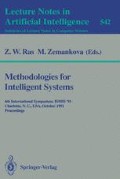Abstract
In systems devoted to diagnostic tasks, the term abduction usually denotes the process of explaining a set of observed manifestations, in the light of an existing domain theory. This amounts to find a set of hypotheses such that the manifestations logically follow from them and from the theory. Then, abduction corresponds to reasoning from consequences to possible premises. On the other hand, an analogous line of reasoning has been independently followed in constructive induction, where new predicates are introduced and theories are completed by trying to invert the resolution mechanism. In this paper, links are established between these two approaches by showing that the inverse resolution operators are sound abductive inference rules, in the case of propositional calculus. Some relationships with deduction in a closed world assumption are also investigated.
Preview
Unable to display preview. Download preview PDF.
References
F. Bergadano, A. Giordana & L. Saitta (1988): “Automated Concept Acquisition in Noisy Environments”, IEEE Trans. on Pattern Analysis and Machine Intelligence, PAMI-10, 555–578.
M. Botta, S. Ravotto, L. Saitta (1991): “Use of Causal Models and Abduction in Learning Diagnostic Knowledge”, Int. J. of Man-Machine Studies, to appear.
K. Clark (1978): “Negation as Failure”, in H. Gallaire and J. Minker (Eds.), Logic and Data Bases, Plenum Press, New York, pp. 293–322.
L. Console, D. Theseider-Dupré, P. Torasso (1991): “On The Relationships between Abduction and Deduction”, Journal of Logic and Computation, to appear.
L. Console, D. Theseider-Dupré, P. Torasso (1989): “Abductive Reasoning through direct Deduction from Completed Domain Models”, in Z. Ras (Ed.), Methodologies for Intelligent Systems 4, North Holland Publ. Co., pp. 175–184.
P.T. Cox, T. Pietrzykowski (1986): “Causes for Events: their Computation and Application”, Lecture Notes in Computer Science, 230, 608–621.
G. DeJong and R. Mooney (1986): “Explanation-Based Learning: An Alternative View”, Machine Learning, 1, 145–176.
J. de Kleer (1986): “An Assumption-Based Truth Maintenance System”, Artificial Intelligence, 28, 127–162.
J. Finger, M.R. Genesereth (1983): “RESIDUE: A Deductive Approach to Design”; Technical Report HPP 83-46, University of Stanford.
H. Geffner (1990): “Causal Theories for Default and Abductive Reasoning”, Proc. AAAI Spring Symposium on Automated Abduction, Stanford, CA, pp. 150–154.
R.T. Hartley, MJ. Coombs (1990): “Abduction in Model Generative Reasoning”, Proc. AAAI Spring Symposium on Automated Abduction, Stanford, CA, pp. 130–134.
B. Meltzer (1970-a): “The Semantics of Induction and the Possibility of Complete Systems of Inductive Inference”, Artificial Intelligence, 1, 189–192.
B. Meltzer (1970-b): “Generation of Hypotheses and Theories”, Nature, 225.
R. Michalski (1983) A Theory and Methodology of Inductive Learning, Artificial Intelligence, 20, 111–161.
T. Mitchell, R.M. Keller, S. Kedar-Cabelli (1986): “Explanation-Based Generalization: A Unifying View”, Machine Learning, 1, 47–80.
C. Morgan (1971): “Hypothesis Generation by Machine”, Artificial Intelligence, 2, 179–187.
S. Morris, O. O'Rorke (1990): “An Approach to Theory Revision Using Abduction”, Proc. AAAI Spring Symposium on Automated Abduction, Stanford, CA, pp. 33–37.
S. Muggleton (1987): “Duce, an Oracle Based Approach to Constructive Induction”, Proc. IJCAI-87 (Milan, Italy), pp. 287–292.
S. Muggleton, W. Buntine (1988): “Machine Invention of First-Order Predicates by Inverting Resolution”, Proc. Fifth Int. Conf. on Machine Learning, (Ann Arbor, MI), pp. 339–352.
D. Poole, R. Goebel, R. Aleliunas (1987): “Theorist: a Logical Reasoning System for Default and Diagnosis”, in N. Cercone and G. McCalla (Eds.), The Knowledge Frontier, Springer Verlag, pp. 331–352.
J.R. Quinlan (1986): “Induction of Decision Trees”, Machine Learning, 1, 81–106.
C. Rouveirol, J.F. Puget (1990): “Beyond Inversion of Resolution”, Proc. Seventh Int. Conf. on Machine Learning, (Austin, TE), pp. 122–131.
C. Sammut, R. Banerji (1986): “Learning Concepts by Asking Questions”, in R. Michalski, J. Carbonell & T. Mitchell (Eds.), Machine Learning, Vol. II, Morgan Kaufmann, Los Altos, CA, pp. 167–191.
Author information
Authors and Affiliations
Editor information
Rights and permissions
Copyright information
© 1991 Springer-Verlag Berlin Heidelberg
About this paper
Cite this paper
Console, L., Giordana, A., Saitta, L. (1991). Investigating the relationships between abduction and inverse resolution in propositional calculus. In: Ras, Z.W., Zemankova, M. (eds) Methodologies for Intelligent Systems. ISMIS 1991. Lecture Notes in Computer Science, vol 542. Springer, Berlin, Heidelberg. https://doi.org/10.1007/3-540-54563-8_95
Download citation
DOI: https://doi.org/10.1007/3-540-54563-8_95
Published:
Publisher Name: Springer, Berlin, Heidelberg
Print ISBN: 978-3-540-54563-7
Online ISBN: 978-3-540-38466-3
eBook Packages: Springer Book Archive

